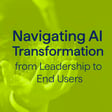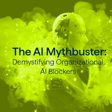
Expert Talk: Unpacking Dynamics 365 Role-based Copilot
In this first part of a two-part podcast series on role-based Copilots, Tony Stewart sits down with Sergio Schaefer, Senior Partner Solution Architect at Microsoft, to explore how Dynamics 365 Role-Based Copilots for service and sales transform business operations. They discuss how these AI-driven assistants streamline sales activities by delivering actionable insights, generating real-time recommendations, and optimizing tasks such as sales chat, email summarization, and follow-ups. On the service side, they examine how Copilots accelerate case resolution times and enhance customer interactions, helping teams work more efficiently while delivering superior experiences.
Tony and Sergio break down real-world applications, share best practices for implementing role-based Copilots, and offer strategies to navigate adoption challenges. They also discuss the ROI of AI-powered copilots, how businesses can prepare for AI integration, and highlight industry-specific use cases that showcase the transformative potential of these intelligent assistants.
Discover how to elevate your customer service with smarter, connected field operations.
Keeping customers satisfied while managing complex field operations can be a challenge, but manufacturers can unlock new levels of efficiency and service with the right tools. From automating work orders with IoT triggers to ensuring field teams have the right parts and insights, you will understand how to drive revenue and exceed customer expectations.
Download the eBook at alithya.com/fieldservice



